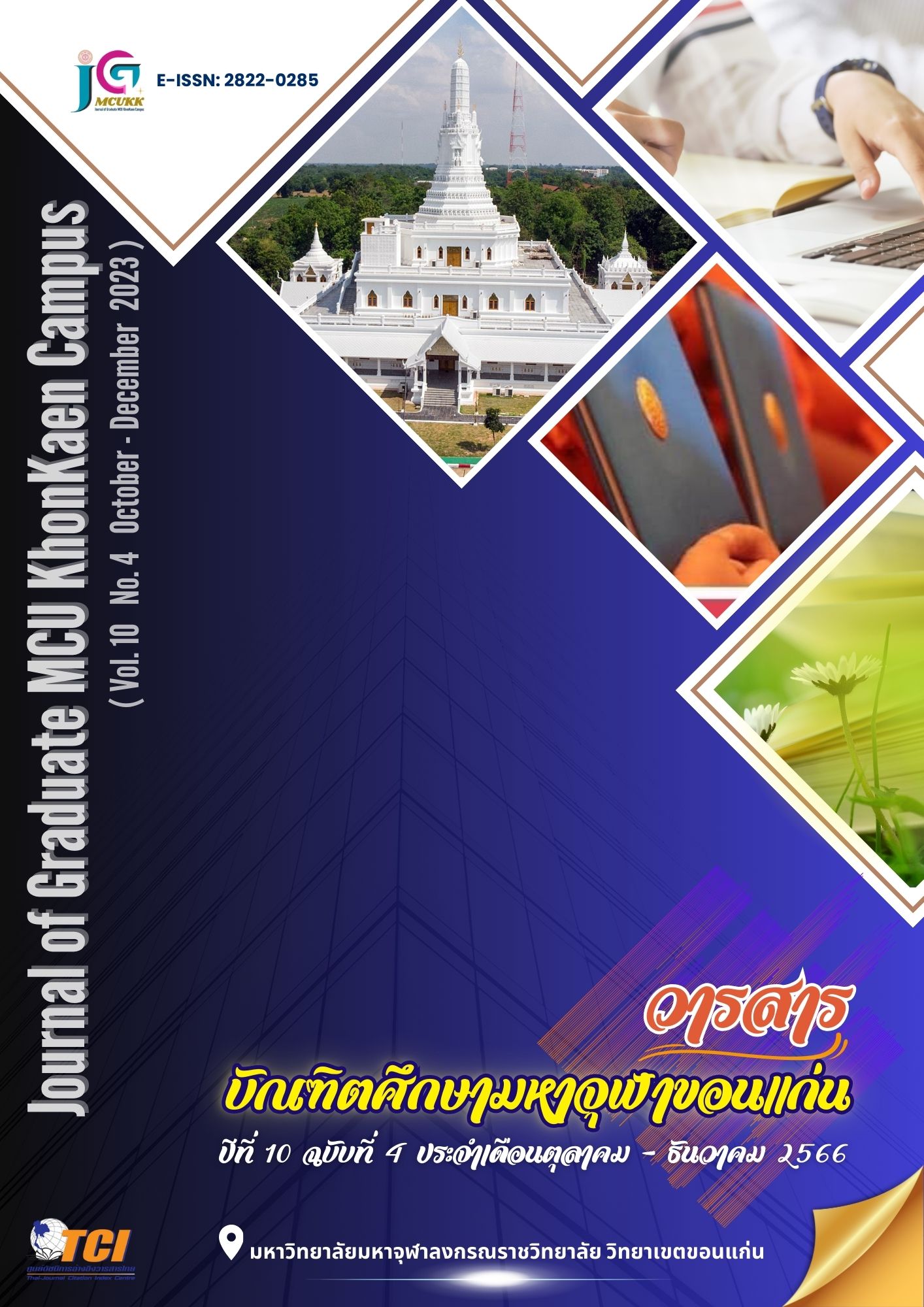การพัฒนาภาวะผู้นำสู่ความเป็นเลิศทางบริหารการศึกษา ตามหลักกัลยาณมิตรธรรม
Main Article Content
บทคัดย่อ
ภาวะผู้นำสู่ความเป็นเลิศทางการบริหารการศึกษาตามหลักกัลยาณมิตรธรรม 7 เป็นภาวะที่ผู้นำใช้กระบวนการโน้มน้าวบุคลากรให้ปฏิบัติงานด้วยความเต็มใจในการทำตามคำสั่ง เพื่อให้เกิดคุณภาพที่เด่นชัด
สูงกว่ามาตรฐานที่กำหนด เป็นที่ยอมรับของสถานศึกษาอื่นและหน่วยงานอื่น โดยมีการช่วยเหลือแนะนำ สนับสนุนจากบุคลากรทั้งในและนอกสถานศึกษาด้วยความเป็นมิตร มีการช่วยเหลือเกื้อกูลกันอย่างเต็มที่และปรารถนาดีต่อกัน เพื่อให้บรรลุผลตามเป้าหมายที่สถานศึกษากำหนด โดยแนวคิดทฤษฎีที่เกี่ยวกับการบริหารสู่ความเป็นเลิศมี 2 แนวคิดทฤษฎี คือ แนวคิดทฤษฎีของ Peters and Waterman และแนวคิดทฤษฎีของ NSW Department of Education ส่วนทฤษฎีภาวะผู้นำมี 3 ทฤษฎี คือ ทฤษฎีการเปลี่ยนแปลงของ Burns ทฤษฎีภาวะผู้นำตามสถานการณ์ของ Hersey and Blanchard และทฤษฎีพฤติกรรมภาวะผู้นำของ Luthans ส่วนหลักกัลยาณมิตรธรรม 7 ประกอบด้วยคุณสมบัติของกัลยาณมิตร 7 ประการ คือ 1) ปิโย เป็นผู้น่ารักหรือเป็นที่รัก 2) ครุ เป็นที่เคารพ 3) ภาวนีโย เป็นที่เจริญใจ เป็นแบบอย่างให้เราได้ 4) วตฺตา จ เป็นผู้ฉลาดในการใช้ถ้อยคำน่ารับฟัง มีเหตุมีผล 5) วจนกฺขโม เป็นผู้อดต่อถ้อยคำ 6) คมฺภีรญฺจ กถ กตฺตา เป็นผู้ที่กล่าวถ้อยคำหรือเรื่องที่ลึกซึ้งได้ 7) โน จฏฺฐาเน นิโยชเย ไม่ชักจูงในสิ่งที่เหลวไหลไร้สาระหรือในทางที่เสียหาย ในการบริหารงานจะต้องมีการจัดโครงสร้างองค์กร ยุทธศาสตร์องค์กร ระบบการทำงาน แนวการบริหาร ทักษะการทำงาน บุคลากร และค่านิยมร่วมกัน โดยเน้นความเป็นเลิศในการเรียนรู้ การสอน การนำ มีการใช้ภาวะผู้นำการเปลี่ยนแปลงเชิงจริยธรรม บริหารงานแบบมีส่วนร่วมตามหลักประชาธิปไตย และใช้หลักกัลยาณมิตรธรรมในการบริหารการศึกษา
Article Details

อนุญาตภายใต้เงื่อนไข Creative Commons Attribution-NonCommercial-NoDerivatives 4.0 International License.
เอกสารอ้างอิง
ฉวีวรรณ แผ่วตะคุ. (2562). ปัจจัยที่มีอิทธิพลต่อความเป็นเลิศของการบริหารโรงเรียนประถมศึกษาขนาดเล็กสังกัดสำนักงานเขตพื้นที่การศึกษาประถมศึกษาภาคตะวันออก. (วิทยานิพนธ์ปริญญาดุษฎีบัณฑิต). ชลบุรี: มหาวิทยาลัยบูรพา.
ติน ปรัชญพฤทธิ์. (2555). ศัพท์รัฐประศาสนศาสตร์. กรุงเทพฯ: จุฬาลงกรณ์มหาวิทยาลัย.
ธนิต รัตนศักดิ์ดา. (2565). ภาวะผู้นำทางวิชาการของผู้บริหารสถานศึกษา สังกัดสำนักงานเขตพื้นที่การศึกษาประถมศึกษาปราจีนบุรี เขต 2. (วิทยานิพนธ์ปริญญาศึกษาศาสตรมหาบัณฑิต). กรุงเทพฯ: มหาวิทยาลัยเกริก.
นพพล ศุภวิทยาเจริญกุล. (2560). ภาวะผู้นำของผู้บริหารสถานศึกษาสังกัดสำนักงานเขตพื้นที่การศึกษา ประถมศึกษาสกลนคร เขต 1. (วิทยานิพนธ์ปริญญาครุศาสตรมหาบัณฑิต).สกลนคร: มหาวิทยาลัยราชภัฎสกลนคร.
เนตร์พัณณา ยาวิราช. (2556). ภาวะผู้นำและผู้นำเชิงกลยุทธ์. (พิมพ์ครั้งที่ 8). กรุงเทพฯ: ทริปเพิ้ลกรุ๊ป.
พงศ์ศักดิ์ รัชตเวชกุล. (2562). ผลกระทบของการบริหารความเป็นเลิศที่มีต่อความสำเร็จขององค์กรของอุตสาหกรรมยานยนต์ในประเทศไทย. (วิทยานิพนธ์ปริญญาการจัดการมหาบัณฑิต). มหาสารคาม: มหาวิทยาลัยมหาสารคาม.
พระครูโกศลธรรมานุสิฐ (ประสิทธิ์ อโสโก/มกรางกูร). (2560). รูปแบบการบริหารจัดการสู่ความเป็นเลิศของสำนักเรียนพระปริยัติธรรมแผนกบาลีในเขตปกครองคณะสงฆ์ภาค 14. (ดุษฎีนิพนธ์ปริญญาพุทธศาสตรดุษฎีบัณฑิต). พระนครศรีอยุธยา: มหาวิทยาลัยมหาจุฬาลงกรณราชวิทยาลัย.
พระธรรมปิฎก (ประยุทธ์ ประยุตฺโต). (2556). ธรรมนูญชีวิต. กรุงเทพฯ: มหาจุฬาลงกรณราชวิทยาลัย.
พระพรหมคุณาภรณ์ (ป.อ. ปยุตโต). (2551). พจนานุกรมพุทธศาสตร์ ฉบับประมวลธรรม. (พิมพ์ครั้งที่ 16). กรุงเทพฯ: เอส อาร์ พริ้นติ้ง แมส โปรดักส์.
พระมหาศุภมิตร วิราม. (2565). การศึกษาเปรียบเทียบแนวคิดเรื่องกัลยาณมิตรตามหลักพุทธจริยศาสตร์ทัศนะของนักเรียนชั้นมัธยมศึกษาตอนปลายของโรงเรียนวัดปากน้ำวิทยาคมและโรงเรียนสุวรรณพลับพลาพิทยาคม. (วิทยานิพนธ์ปริญญาอักษรศาสตรมหาบัณฑิต). กรุงเทพฯ: มหาวิทยาลัยมหิดล.
พัชรา วณิชวศิน. (2560). การพัฒนาภาวะผู้นำ : จากทฤษฎีสู่แนวปฏิบัติที่ดีและกรณีศึกษา. กรุงเทพฯ: ปัญญาชน.
สมาน อัศวภูมิ. (2559). ความเป็นเลิศและการจัดการความเป็นเลิศ. วารสารบริหารการศึกษาบัวบัณฑิต มหาวิทยาลัยราชภัฏอุบลราชธานี, 16(1), 1-5.
สวัสดิ์ ทองมีเพชร. (2561). ชุดฝึดอบรมวิธีพัฒนาจิต. กรุงเทพฯ: กระทรวงศึกษาธิการ.
อะดิศักดิ์ สมบัติคำ. (2565). การบริหารงานตามหลักกัลยาณมิตรธรรม 7 ของนายกองค์การบริหารส่วนตำบลหนองเรือ ตำบลหนองเรือ อำเภอนาเชือก จังหวัดมหาสารคาม. (วิทยานิพนธ์ปริญญารัฐศาสตรมหาบัณฑิต). มหาสารคาม: มหาวิทยาลัยมหาสารคาม.
Burns, J. M. (1978). Leadership. New York: Harper and Row.
Deporter, B. (2000). The 8 keys of Excellence : Principles to live By. Folida: Forum Learning.
Draft, R. L. (2005). The leadership experience. (3rded). Mason, OH: Thomson South-Western.
Hersey, P., & Blanchard, K. H. (1982). Management of organizational behavior: Utilizing human resources. New York: Prentice-Hall.
Luthans, F. (1998). Organizational behavior. 8thed. Boston: Irwin McGraw-Hill.

